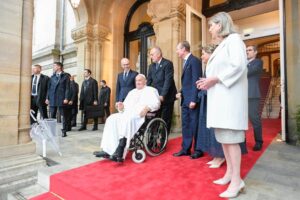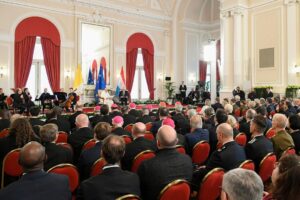In his first official intervention during the eight-hour visit to Luxembourg, Pope Francis stressed the crucial role of this small nation at the heart of Europe in fostering European unity and peace, while denouncing the resurgence of nationalism and wars.
Luxembourg is an example of peace
“Luxembourg can show everyone the advantages of peace in the face of the horrors of war (…) and the benefits of cooperation between nations in contrast to the harmful consequences of hardened positions and the selfish and short-sighted, and even violent, pursuit of one’s interests.”
On Thursday morning, upon arriving in the Grand Duchy of Luxembourg, Pope Francis encouraged local authorities to maintain their historic commitment to peace and the construction of a “united and fraternal Europe” amid the resurgence of nationalism and threats of war on the continent.
 Luxembourg’s historic role in promoting peace and unity in Europe
Luxembourg’s historic role in promoting peace and unity in Europe
Addressing the authorities, civil society and the diplomatic corps in his first speech in the Grand Duchy at the Cercle Cité palace, the Pope recalled that Luxembourg has often found itself at the crossroads of Europe’s most significant historical events and acknowledged its crucial role in promoting peace and unity in Europe following the ravages of the Second World War, as a founding member of the European Union.
He praised its “solid democratic structure” that promotes human dignity and the rule of law, allowing this small nation in the heart of Europe to prosper and play an important role in the continental context. “Indeed,” the Pope noted, “it is not the size of the territory nor the number of inhabitants that serves as an indispensable condition for a State to play an important role on the international scene, or for it to become an economic and financial center.”
Wealth includes responsibility towards the most vulnerable
Recalling the words of St. John Paul II during his apostolic journey to Luxembourg in 1985, Pope Francis reiterated the need for solidarity among nations, especially in supporting the poorest countries, and encouraged Luxembourg, as an “important crossroads of cultures,” to continue its mission of promoting cooperation globally, so that “everyone can become protagonists of an organized process of integral development,” in line with the social doctrine of the Church.
He made a particular call for a development model that respects the environment and opposes social exclusion, reminding the audience “that having wealth entails responsibility.”
“For development to be authentic and integral, we must not plunder or degrade our common home. Likewise, we must not abandon peoples or social groups on the margins.”
The Pope insisted on the duty of wealthy nations like Luxembourg to help disadvantaged countries emerge from poverty, also to “ensure a decrease in the number of those forced to emigrate.” In this regard, he noted that the Grand Duchy, with its history and multicultural population, can serve as a model for welcoming and integrating migrants and refugees.
 May Gospel values guide world leaders towards peace
May Gospel values guide world leaders towards peace
Referring to the current dramatic global context, Pope Francis deplored the resurgence of armed conflicts in Europe and around the world, where humanity seems to be repeating the same mistakes of the past, aggravated today “by the greater technological power that human beings now possess.”
To prevent reason from succumbing to the senselessness of war with its “immense human costs and more useless massacres,” the Holy Father stressed the need for peoples and their leaders “to be motivated by noble and profound spiritual values.”
Reaffirming the Church’s commitment to serve humanity and promote peace, solidarity and justice, he urged that the Gospel of Jesus Christ guide individuals and societies towards reconciliation and the peaceful resolution of conflicts.
“As the Successor of the Apostle Peter, and on behalf of the Church, which is expert in humanity, I am here to testify that the Gospel is the source of life and the ever-fresh force of personal and social renewal.”
He therefore encouraged Luxembourg to continue to demonstrate the benefits of peace, integration and cooperation, and urged world leaders to engage “resolutely” in honest negotiations to resolve differences, together with a “readiness to find honorable compromises, which undermine nothing and can instead build security and peace for all.”
“One of your vocations is to help the world make peace”
“To serve”
To conclude his speech, Pope Francis explained that the motto of his visit “Pour serve” – ”To serve”, refers to the mission of the Church, but applies to everyone as a noble task and a way of life to follow every day. “May God always allows you to serve with a joyful and generous heart,” he concluded.



 Luxembourg’s historic role in promoting peace and unity in Europe
Luxembourg’s historic role in promoting peace and unity in Europe May Gospel values guide world leaders towards peace
May Gospel values guide world leaders towards peace






